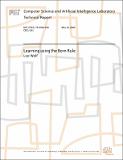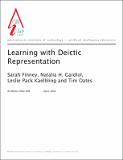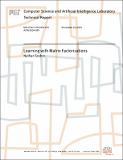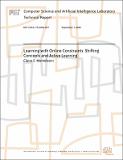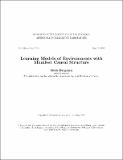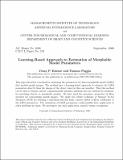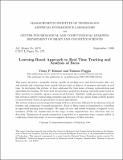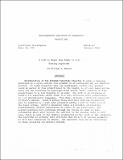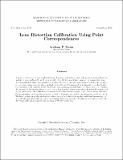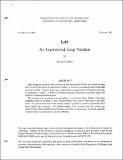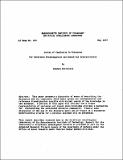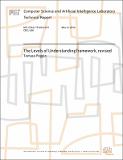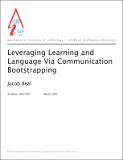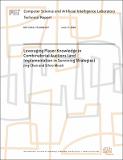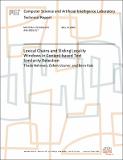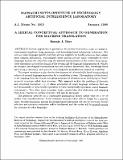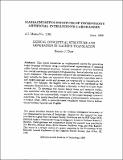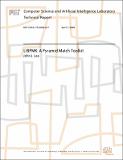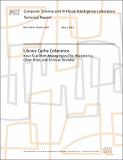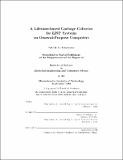Browsing Computer Science and Artificial Intelligence Lab (CSAIL) by Title
Now showing items 1834-1853 of 3804
-
Learning using the Born Rule
(2006-05-16)In Quantum Mechanics the transition from a deterministic descriptionto a probabilistic one is done using a simple rule termed the Bornrule. This rule states that the probability of an outcome ($a$)given a state ($\Psi$) ... -
Learning with Deictic Representation
(2002-04-10)Most reinforcement learning methods operate on propositional representations of the world state. Such representations are often intractably large and generalize poorly. Using a deictic representation is believed to be ... -
Learning with Matrix Factorizations
(2004-11-22)Matrices that can be factored into a product of two simpler matricescan serve as a useful and often natural model in the analysis oftabulated or high-dimensional data. Models based on matrixfactorization (Factor Analysis, ... -
Learning with Online Constraints: Shifting Concepts and Active Learning
(2006-09-01)Many practical problems such as forecasting, real-time decisionmaking, streaming data applications, and resource-constrainedlearning, can be modeled as learning with online constraints. Thisthesis is concerned with analyzing ... -
Learning World Models in Environments with Manifest Causal Structure
(1995-05-05)This thesis examines the problem of an autonomous agent learning a causal world model of its environment. Previous approaches to learning causal world models have concentrated on environments that are too "easy" ... -
Learning-Based Approach to Estimation of Morphable Model Parameters
(2000-09-01)We describe the key role played by partial evaluation in the Supercomputing Toolkit, a parallel computing system for scientific applications that effectively exploits the vast amount of parallelism exposed by partial ... -
Learning-Based Approach to Real Time Tracking and Analysis of Faces
(1999-09-23)This paper describes a trainable system capable of tracking faces and facialsfeatures like eyes and nostrils and estimating basic mouth features such as sdegrees of openness and smile in real time. In developing this ... -
A Left to Right then Right to Left Parsing Algorithm
(1968-02-01)Determination of the minimum resources required to parse a language generated by a given context free grammar is an intriguing and yet unsolved problem. It seems plausible that any unambiguous context free grammar could ... -
Lens Distortion Calibration Using Point Correspondences
(1996-12-01)This paper describes a new method for lens distortion calibration using only point correspondences in multiple views, without the need to know either the 3D location of the points or the camera locations. The standard ... -
LetS: An Expressional Loop Notation
(1983-02-01)Many loops can be more easily understood and manipulated if they are viewed as being built up out of operations on sequences of values. A notation is introduced which makes this viewpoint explicit. Using it, loops can ... -
Levels of Complexity in Discourse for Reference Disambiguation and Speech Act Interpretation
(1977-05-01)This paper presents a discussion of means of describing the discourse and its components which makes speech act interpretation and reference disambiguation possible with minimal search of the knowledge in the database. ... -
The Levels of Understanding framework, revised
(2012-05-31)I discuss the "levels of understanding" framework described in Marr's Vision and propose a revised and updated version of it to capture the changes in computation and neuroscience over the last 30 years. -
Leveraging Learning and Language Via Communication Bootstrapping
(2003-03-17)In a Communication Bootstrapping system, peer components with different perceptual worlds invent symbols and syntax based on correlations between their percepts. I propose that Communication Bootstrapping can also be ... -
Lexical Chains and Sliding Locality Windows in Content-based Text Similarity Detection
(2005-05-19)We present a system to determine content similarity of documents. More specifically, our goal is to identify book chapters that are translations of the same original chapter; this task requires identification of not only ... -
A Lexical Conceptual Approach to Generation for Machine Translation
(1988-01-01)Current approaches to generation for machine translation make use of direct-replacement templates, large grammars, and knowledge-based inferencing techniques. Not only are rules language-specific, but they are too ... -
Lexical Conceptual Structure and Generation in Machine Translation
(1989-06-01)This report introduces an implemented scheme for generating target- language sentences using a compositional representation of meaning called lexical conceptual structure. Lexical conceptual structure facilitates two crucial ... -
LIBPMK: A Pyramid Match Toolkit
(2008-04-07)LIBPMK is a C++ implementation of Grauman and Darrell's pyramid match algorithm. This toolkit provides a flexible framework with which developers can quickly match sets of image features and run experiments. LIBPMK provides ... -
Library Cache Coherence
(2011-05-02)Directory-based cache coherence is a popular mechanism for chip multiprocessors and multicores. The directory protocol, however, requires multicast for invalidation messages and the collection of acknowledgement messages, ... -
A Lifetime-based Garbage Collector for LISP Systems on General-Purpose Computers
(1988-02-01)Garbage collector performance in LISP systems on custom hardware has been substantially improved by the adoption of lifetime-based garbage collection techniques. To date, however, successful lifetime-based garbage ...

